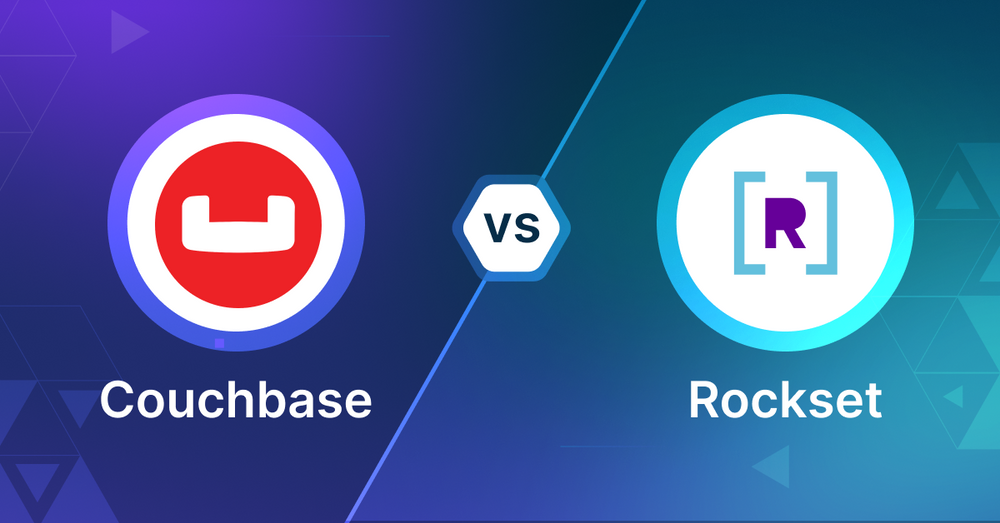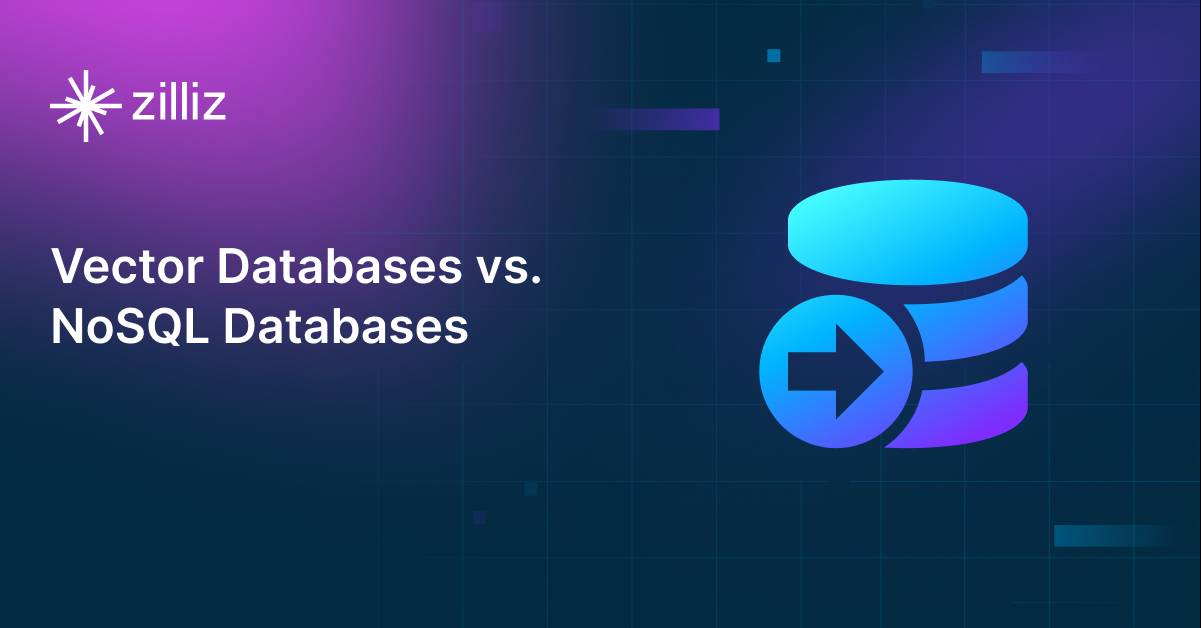Couchbase vs Rockset: Choosing the Right Vector Database for Your AI Apps

What is a Vector Database?
Before we compare Couchbase and Rockset, let's first explore the concept of vector databases.
A vector database is specifically designed to store and query high-dimensional vectors, which are numerical representations of unstructured data. These vectors encode complex information, such as the semantic meaning of text, the visual features of images, or product attributes. By enabling efficient similarity searches, vector databases play a pivotal role in AI applications, allowing for more advanced data analysis and retrieval.
Common use cases for vector databases include e-commerce product recommendations, content discovery platforms, anomaly detection in cybersecurity, medical image analysis, and natural language processing (NLP) tasks. They also play a crucial role in Retrieval Augmented Generation (RAG), a technique that enhances the performance of large language models (LLMs) by providing external knowledge to reduce issues like AI hallucinations.
There are many types of vector databases available in the market, including:
- Purpose-built vector databases such as Milvus, Zilliz Cloud (fully managed Milvus)
- Vector search libraries such as Faiss and Annoy.
- Lightweight vector databases such as Chroma and Milvus Lite.
- Traditional databases with vector search add-ons capable of performing small-scale vector searches.
Couchbase is distributed multi-model NoSQL document-oriented database with vector search capabilities as an add-on and Rockset is a search and analytics database. This post compares their vector search capabilities.
What is Couchbase? An Overview
Couchbase is a distributed, open source NoSQL database for cloud, mobile, AI and edge computing. It combines the best of relational databases with the flexibility of JSON. Couchbase also allows you to do vector search even though it doesn’t have native vector indexes. Developers can store vector embeddings—numerical representations generated by machine learning models—within Couchbase documents as part of their JSON structure. These vectors can be used in similarity search use cases such as recommendation systems or retrieval-augmented generation both based on semantic search where finding data points close to each other in a high dimensional space is important.
One way to do vector search in Couchbase is by using Full Text Search (FTS). FTS is designed for text search but can be used for vector search by converting vector data into searchable fields. For example, vectors can be tokenized into text-like data and FTS can index and search based on those tokens. This will give you approximate vector search and a way to query documents with vectors that are close in similarity.
Alternatively developers can store the raw vector embeddings in Couchbase and do the vector similarity calculations at the application level. This means retrieving documents and computing metrics such as cosine similarity or Euclidean distance between vectors to find the closest matches. This way Couchbase will be used as storage for vectors and the application will handle the math.
For more advanced use cases some developers integrate Couchbase with specialized libraries or algorithms that enable vector search. These integrations allow Couchbase to manage the document store and the external libraries will do the actual vector comparisons. This way Couchbase can still be part of a solution that does vector search.
By using these approaches Couchbase can be used for vector search functionality and be a flexible option for various AI and machine learning use cases that require similarity search.
Rockset: Overview and Core Technology
Rockset is a real-time search and analytics database for structured and unstructured data, including vector embeddings. Its sweet spot is ingesting, indexing and querying data in real-time so it’s great for applications that need up-to-the-second insights. Rockset supports both streaming and bulk data ingestion, can process high velocity event streams and change data capture (CDC) feeds in 1-2 seconds.
One of Rockset’s key features is Converged Indexing built on mutable RocksDB. This allows for in-place updates of vectors and metadata so it’s super efficient for scenarios where data changes frequently. Rockset can handle documents up to 40MB and supports vector dimensionality up to 200,000 so it’s good for a wide range of vector embedding use cases.
Rockset has vector search built into the core. It supports K-Nearest Neighbors (KNN) and Approximate Nearest Neighbors (ANN) search methods and uses a distributed FAISS index for scalability. Rockset is algorithm agnostic, so you can choose your own search implementation. The cost-based optimizer can dynamically choose between KNN and ANN search methods for optimal performance.
What’s unique about Rockset for vector search is the Converged Index which combines search, ANN, columnar and row indexes into one. This means you can handle a wide range of query patterns out of the box. Rockset also supports metadata filtering and hybrid search. The optimizer will choose the most efficient query path. Can search across multiple ANN fields, supports multi-modal models and has both SQL and REST APIs for query interface.
Key Differences
Search Methodology
Couchbase approaches vector search by adapting existing features. It doesn’t have native vector indexes but has workarounds. One way is to use Full Text Search (FTS) and convert vector data into searchable fields. This gives you an approximate vector search by querying documents with similar vectors. Another way is to store raw vector embeddings and do similarity calculations at the application level.
Rockset has vector search built into the core. It supports K-Nearest Neighbors (KNN) and Approximate Nearest Neighbors (ANN) search methods. Rockset uses a distributed FAISS index for scalability and is algorithm-agnostic, so you can choose your preferred search implementation. Its cost-based optimizer can dynamically switch between KNN and ANN for best performance.
Data Handling
Couchbase combines the features of relational databases with the flexibility of JSON. It allows storing vector embeddings within JSON documents so it’s good for handling structured, semi-structured and unstructured data. This flexibility is useful for projects that need to work with different data types along with vector embeddings.
Rockset uses a Converged Index that combines search, ANN, columnar and row indexes into one. This unified approach allows Rockset to handle a wide range of query patterns out of the box. It supports both streaming and bulk data ingestion, processing high-velocity event streams and change data capture feeds fast. Rockset can handle documents up to 40MB and supports vector dimensionality up to 200,000.
Scalability and Performance
Couchbase as a distributed NoSQL database is designed for scalability. But its performance for vector search depends on the chosen implementation method. When using the application level calculation approach, scalability is limited by the application’s processing power.
Rockset’s distributed FAISS index and Converged Indexing on top of mutable RocksDB allows for scaling and performance. It can process and index data in real-time so it’s good for applications that need up-to-the-second insights. The in-place updates of vectors and metadata makes it very efficient for scenarios with frequently changing data.
Flexibility and Customization
Couchbase gives you a lot of flexibility in implementing vector search. You can choose to use built-in features like FTS or implement custom solutions. This flexibility extends to integrating with specialized libraries for more advanced vector operations.
Rockset gives you flexibility through its algorithm-agnostic approach so you can choose your preferred search implementation. It supports metadata filtering and hybrid search and its optimizer can choose the best query path. Rockset also supports searching across multiple ANN fields and multi-modal models.
Integration and Ecosystem
Couchbase supports cloud, mobile, AI and edge computing scenarios. It can be integrated with external libraries for more vector search functionality so it’s good for various environments.
Rockset has both SQL and REST APIs for query interfaces so it’s easy to integrate with existing systems and tools. It can also handle streaming data and CDC feeds so it’s good for real-time data processing pipelines.
Ease of Use
Implementing vector search in Couchbase requires more effort as you need to choose and implement the right approach for your use case. This could mean a steeper learning curve especially for complex vector search.
Rockset’s built-in vector search and Converged Index might give you a smoother experience especially if you’re new to vector search. But ease of use ultimately depends on your project requirements and your team’s familiarity with each system.
When to Choose Each
Couchbase is for projects that need a flexible general purpose database with vector search. It’s great for applications that have diverse data types and need to integrate vector search into a broader data management strategy. Couchbase is good when you’re working with JSON documents and need to combine traditional database operations with vector similarity searches. It’s particularly good for recommendation systems, content retrieval and applications that need to store and query both structured and unstructured data alongside vector embeddings. Choose Couchbase when you need a database that can handle many data types and querying methods and are willing to implement custom vector search or integrate with external libraries for more advanced vector operations.
Rockset is for real-time search and analytics applications that need immediate insights from vector data. It’s great for use cases that require fast processing of high velocity data streams and frequent updates to vector embeddings. Rockset’s built-in vector search is good for real-time machine learning, live analytics dashboards and scenarios where you need to combine vector search with complex SQL queries. Choose Rockset when your primary use case is real-time data processing and analytics and you need a solution that can handle vector search along with other types of queries. It’s particularly good for projects that require rapid ingestion and indexing of streaming data and can benefit from hybrid searches combining vector similarity with metadata filtering.
Summary
Couchbase’s strengths are flexibility, JSON support and ability to integrate vector search into a general purpose NoSQL database. It gives developers the ability to implement custom vector search within a familiar database environment so it’s a good choice for projects that need to balance traditional database operations with vector search. Rockset is great for real-time data processing and built-in vector search. Its Converged Indexing and high-dimensional vectors make it a good choice for applications that need immediate insights from rapidly changing data.
Choose between Couchbase and Rockset based on your use cases, data types and performance requirements. If you need a database that can handle many data types and vector search alongside other database operations Couchbase might be the way to go. If real-time analytics and vector search in high velocity data environments is your primary focus then Rockset might be more suitable. Consider your existing infrastructure, your development team’s expertise, the type of data (static vs streaming) and the requirements of your application when making your decision. Remember the best choice will align with your project’s unique needs, scalability requirements and long term goals for using vector search for AI and machine learning applications.
While this article provides an overview of Couchbase and Rockset, it's key to evaluate these databases based on your specific use case. One tool that can assist in this process is VectorDBBench, an open-source benchmarking tool designed for comparing vector database performance. Ultimately, thorough benchmarking with specific datasets and query patterns will be essential in making an informed decision between these two powerful, yet distinct, approaches to vector search in distributed database systems.
Using Open-source VectorDBBench to Evaluate and Compare Vector Databases on Your Own
VectorDBBench is an open-source benchmarking tool designed for users who require high-performance data storage and retrieval systems, particularly vector databases. This tool allows users to test and compare the performance of different vector database systems such as Milvus and Zilliz Cloud (the managed Milvus) using their own datasets and determine the most suitable one for their use cases. Using VectorDBBench, users can make informed decisions based on the actual vector database performance rather than relying on marketing claims or anecdotal evidence.
VectorDBBench is written in Python and licensed under the MIT open-source license, meaning anyone can freely use, modify, and distribute it. The tool is actively maintained by a community of developers committed to improving its features and performance.
Download VectorDBBench from its GitHub repository to reproduce our benchmark results or obtain performance results on your own datasets.
Take a quick look at the performance of mainstream vector databases on the VectorDBBench Leaderboard.
Read the following blogs to learn more about vector database evaluation.
Further Resources about VectorDB, GenAI, and ML
- What is a Vector Database?
- What is Couchbase**? An Overview**
- Rockset: Overview and Core Technology
- Key Differences
- When to Choose Each
- Summary
- Using Open-source VectorDBBench to Evaluate and Compare Vector Databases on Your Own
- Further Resources about VectorDB, GenAI, and ML
Content
Start Free, Scale Easily
Try the fully-managed vector database built for your GenAI applications.
Try Zilliz Cloud for FreeKeep Reading

The Real Bottlenecks in Autonomous Driving — And How AI Infrastructure Can Solve Them
Autonomous driving is data-bound. Vector databases unlock deep insights from massive AV data, slashing costs and accelerating edge-case discovery.

Vector Databases vs. NoSQL Databases
Use a vector database for AI-powered similarity search; use NoSQL databases for flexibility, scalability, and diverse non-relational data storage needs.

Empowering Women in AI: RAG Hackathon at Stanford
Empower and celebrate women in AI at the Women in AI RAG Hackathon at Stanford. Engage with experts, build innovative AI projects, and compete for prizes.
The Definitive Guide to Choosing a Vector Database
Overwhelmed by all the options? Learn key features to look for & how to evaluate with your own data. Choose with confidence.